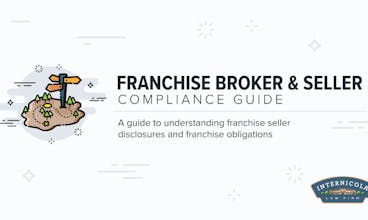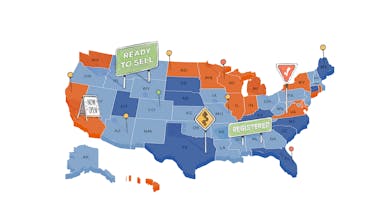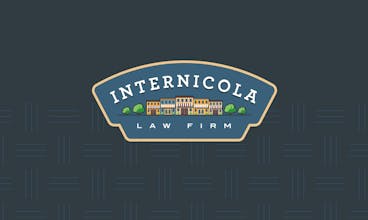Item 14 of the Franchise Disclosure Document
Within Item 14, the franchisor must disclose information about any patents, copyrights and other proprietary information that is related to the franchise system.
Proprietary information, copyrights, and sometimes even patents are important – and often necessary – components of many franchise systems.
From the contents of an operations manual to copyrighted materials and equipment that relies on patented processes, franchisees need to be aware of any legal protections, licenses or restrictions on the material intellectual property they will use or have access to during their business’s daily operations. Before investing in a franchise, candidates should be able to find this information in Item 14 of the Franchise Disclosure Document (FDD).
Below, we’ll explore the patent, copyright and proprietary information disclosures that franchisors must include in Item 14 to help franchisee candidates recognize the value of investing in a brand that takes intellectual property rights seriously.
What Information Must Be Disclosed in Item 8?
Under the federal Franchise Rule, franchisors must disclose whether they own rights or licenses to any copyrights or patents, including pending applications for patents, that are material to the franchise. Because franchisors are only required to disclose copyrights and patents that have a material impact on the operations of the franchise system, it’s a good idea to consult with a franchise attorney when determining which intellectual property to include in Item 14.
For each disclosure, the franchisor must describe the nature of the intellectual property and its relationship to the franchise.
Rights and Ownership of Material Patents
Under 16 CFR § 436.5(n), for each material patent disclosed in Item, 14 franchisors must address the patent number, issuance date, title, duration and type (e.g., design or process).
Pending Material Patent Applications
For pending patent applications that are material to the franchised business, franchisors must disclose the application’s serial number, filing date, title and type of patent application.
Rights and Ownership of Material Copyrights
For each copyright disclosed in Item 14, franchisors must disclose the copyright’s registration date and number, its duration and whether the franchisor intends to renew the copyright upon its expiration.
Legal Determinations, Proceedings and Agreements
Franchisors must disclose whether they have any current material determinations from the U.S. Patent and Trademark Office (USPTO), the U.S. Copyright Office (USCO), or a court related to a patent or copyright disclosed in Item 14. If so, they must state the forum and matter number and describe how the determination affects the franchised business.
Per 16 CFR § 436.5(n)(3), in circumstances where pending litigation exists related to a franchisor’s intellectual property disclosed in Item 14, the franchisor must “state the forum, case number, claims asserted, issues involved, and effective determinations for any material proceeding pending in the United States Patent and Trademark Office or any court.”
In addition to litigation, franchisors must also disclose whether any agreements exist that limit the use of a disclosed patent, pending patent or copyright that is material to the franchise. The franchisor must also state the parties to each agreement, its duration, other material terms, and how the agreement could affect the franchisee.
Attorney’s Opinion
The federal Franchise Rule permits franchisors to include an attorney’s opinion regarding pending litigation or actions related to the intellectual property disclosed in Item 14, so long as the attorney issuing the opinion has granted permission for it to be included in the FDD. Alternatively, a summary of the opinion may be presented in Item 14 so long as the full opinion is attached to Item 22 and the attorney issuing the opinion permits its use for such purposes.
Franchisor’s Obligation to Protect Patents and Copyrights
Because protecting intellectual property is the best way to maintain its value to a brand, franchisors must disclose their obligation to protect the copyrights, patents and patent applications disclosed in Item 14. Franchisors are also required to disclose their obligations to protect franchisees from claims related to their use of the franchisor’s patents and copyrights. These disclosures must address:
Whether the franchisor’s obligations are contingent on the franchisee notifying the franchisor of infringement claims, or whether such notifications would be elective.
Whether the franchisor must take affirmative action when notified of an infringement claim under the franchise agreement.
Which parties have the right to control infringement-related litigation.
Whether the franchisor must participate in the franchisee’s defense or indemnify the franchisee for expenses or damages for cases involving intellectual property licensed to the franchisee.
Whether the franchisor’s obligations are contingent on the franchisee’s modification or discontinuation of the patented or copyrighted material’s use.
If the franchisee is required to modify or discontinue the use of the patented or copyrighted material, the franchisor must disclose the franchisee’s rights under those circumstances.
Known Infringements
In situations where a franchisor is aware of a patent or copyright infringement that could materially impact the franchisee, they must disclose this information in Item 14. This disclosure should describe the nature of the infringement and its location(s), known duration and any actions taken or expected to be taken by the franchisor.
Confidential Information and Trade Secrets
Within Item 14, the franchisor must also disclose, in general terms, any other confidential information or trade secrets to which the franchisor claims proprietary rights.
Other Considerations
Although franchisors sometimes decide against registering their copyrights with the U.S. Copyright Office (USCO) to avoid publicly disclosing confidential information, it’s still important to communicate whether specific materials contain confidential or proprietary information and whether they are protected by common law copyright. On materials or intellectual property that franchisees and candidates are granted access to, franchisors should indicate the appropriate legal protections and restrictions.
Whether you’re a franchisor or a franchisee candidate, navigating the legal status, protections and restrictions on patents, copyrights and proprietary information can be complicated. When preparing or reviewing Item 14 of the FDD, it’s important to seek the advice of an experienced franchise attorney that can guide you through the process with expertise.



